As the Supreme Being and I drove home last night after watching Nickel Boys (in 35mm, at the historic Grand Lake Theater in Oakland), I found myself saying, “The farther I get from that film, the less interesting it seems.”
And that’s kind of a bummer, as much hay had been made of its first-person perspective and of its weighty subject matter. But then, this morning, I’m still thinking about it, and so maybe I was being rash?
Seems like I better write something, so we can all process our thoughts together. And, while we’re at it, let’s also talk about Heretic, which I find in odd confluence with Nickel Boys: Two films that take what you see and what you believe and then shake it all up to disorient you, on purpose.
Nickel Boys Tries to Get in Your Head. Or to Put You in Its Head. Or, Probably, Both.
If you haven’t heard, Nickel Boys — based on the novel by Colson Whitehead, directed by RaMell Ross — is the immersive story of two Black teens who have been sentenced to a reform school in 1960s Jim Crow Florida. It’s immersive in that nearly all filming is done with the camera in the perspective of these two boys. So you see either Elwood (primarily Ethan Herisse) or Turner (Brandon Wilson) when the other is looking at him, but you (almost) never see the person who’s doing the looking.
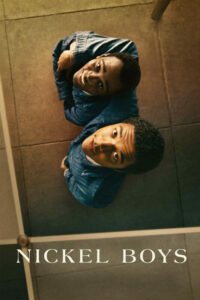
That’s the method. And it’s madness — purposefully, I’d surmise.
The idea being that you are literally squeezed into the experience and perspective of these young Black men. The question then is: does this make you feel as they do or does it make the film strangely dissociative or both. Personally, I’m going with both. Your results may differ.
At first, when the film opens with the life of young Elwood, this cinematic conceit does the trick marvelously. You’re under the Christmas tree with him, looking up as his nana drops tinsel on his/your head. You’re watching the grown ups drink, and play cards, when you should be in bed. It’s magical, and sweet, and confusing because you’re a child in a strange and dangerous world.
But Elwood grows up. He gets involved in the civil rights movement. And the first mysterious alligator crosses his path — a literal one, although one presumes, if one is me, that the gators are in the film figuratively, just one piece of the picture’s poetry. And poetic it is. In its obscurity (the flashes of half-seen things, unfocused views, and suggestive glimpses) it reminded me some of the look of Upstream Color.
But, as Supreme Being questioned later, “Is this really how we see the world?”
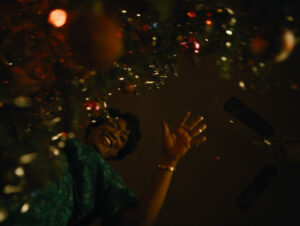
No. But then, I’m not a Black teen in 1960s Florida, and this film isn’t about me; it’s about getting me to step into a different perspective. To understand the pervasive and lingering wrongness it inhabits.
And that’s where Nickel Boys didn’t work for me. Because while the early sections of the film had me drifting close to the POV of Elwood, the rest didn’t. As you’ve read, Elwood is sentenced to the Nickel Academy — wrongly, unsurprisingly. The segregated school is a place of violence, corruption, and cruelty, and all of it is deeply, unsparingly racist. Elwood befriends Turner and, back and forth, they trade control of your viewpoint.
This is as confusing as you might picture. One is challenged to maintain track of whose eyes we’re seeing through, what they’re experiencing, and why. The fluid camera is burdensome. Which might be intentional, probably is, as the lives of these boys is nothing if not burdened. Yet, this style of camerawork doesn’t help me share their burden or feel it. The burden I feel seems unrelated, or irreconcilable to their, much larger burden. The burden I feel is an alienating, disorienting one. It makes me not want to be in their heads, and why would I?
Maybe it’s all working as intended, or maybe it’s not. Maybe Nickel Boys achieves all it sets out to, and I’m too jaded to appreciate it. Maybe I’ve got the wrong eyes in the wrong head.
Or maybe Nickel Boys leaves too much of the burden of storytelling on our shoulders. Perhaps it leaves too much of the violence, corruption, and cruelty of The Nickel Academy to our imagination — because it’s not in the film. There is a beating, unseen. There is torture, discussed. There is corruption, and coercion, and forced labor, and even murder — but while we see through Elwood and Turner’s eyes, we don’t strain with our bodies nor experience their exhaustion and despair. Nickel Academy appears lousy, but in a way that’s only poetic and suggestive. We are told at the start that there is a way to progress through Nickel Academy to graduation and return to home. Nothing ever comes of it. If Elwood’s behavior advances him toward his goals or not, or if Turner’s does or doesn’t, we are completely in the dark. Time has stuttered and stopped.
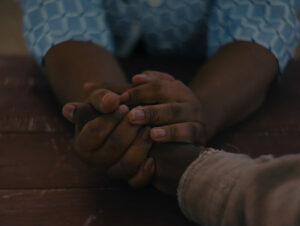
Then, if Elwood and Turner see the worst side of the school, we’re aren’t allowed access to that vision. It is our burden to accept on hearsay that their lives at Nickel are despairing, and to allow that hidden trauma to drive their/our decisions. It is only at the very end, when characters share their emotion at what Nickel Academy did and was, that the weight of it becomes at all tangible. While it is happening it feels a dream. And that, too, is likely done with intention.
How the story progresses and ends is interesting, yet I struggled to maintain investment in characters I mostly couldn’t see and whose experiences fell piecemeal into my eyes.
And so I liked what Nickel Boys wanted to be, but remain unmoved by what it was.
Welcome to Hugh Grant’s Uncomfortably Religious Boudoir
I don’t watch a lot of horror films. Generally, I either find them gross or stupid or both. There are exceptions. I finally watched The Babadook and it genuinely scared me. Barbarian was of interest, I guess. The Shining, of course, and Cronenberg’s icky stuff, etc.
Which is to say, I’m sort of at a loss as to why I felt compelled to check out The Heretic. Perhaps it’s because, after his turn in Paddington 2, I knew Hugh Grant was destined to be an excellently creepy ne’er-do-well. Or maybe it’s because I spring from a family in the religion business and I’ve been working with religious institutions lately. In either case, watch it I did.
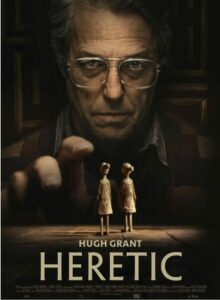
And you know what? I liked it.
Heretic, written and directed by Scott Beck and Bryan Woods, tells the lovely little tale of two Mormon missionaries (Sophie Thatcher, Chloe East) who are lured into a witch’s cottage so they can be shoved in the proverbial oven.
Here, Hugh Grant plays the witch. His character, Mr. Reed, is intelligent, smarmily charming, and — to be reductive — Hugh Grant. I mean, I assume that Hugh Grant isn’t a murderous heretical psychopath but I’ve never met him. I guess I wouldn’t be horribly surprised? Or disappointed?
Ahem.
For the first half of Heretic, we squeeze onto the uncomfortable couch with Sister Barnes and Sister Paxton as they, slowly, believably, clue into the fact that their host is absolutely fucking nutsy cuckoo bananas. He, like someone with OCD peeling grapes, takes their faith apart. He pulls the wings off their butterflies, figuratively at least. And I was all there for it.
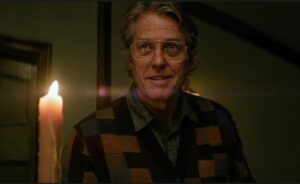
He (and, by necessity, the script) is intelligent. His points are erudite and presented in a way that brooks no sensible challenge, although these two young women do their best. They try to maintain their composure. They attempt to hold faith. They do what they can to avoid angering the very nice, very polite man who has locked them in his house with evil intent.
And so, like Nickel Boys, Heretic takes what you believe and what you see and forces you to see it another way. It does it in a way that’s successfully disorienting and — in a way I found humorous, as I’m that kind of bastard — disturbing. Then, as horror movies do, it turns up the heat and takes a deeply uncomfortable theoretical conversation and makes it real.
What do you believe? Is your faith unshakeable? What if we add a little blood, or take it?
I found this second half of the film less compelling and enjoyable. I loved Hugh Grant’s Mr. Reed when he was a believable and deeply misguided mansplaining kook. When his literal knives came out, my suspension of disbelief became resuspended, back from the dead, as it were, like one religious icon or another.
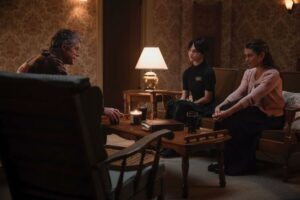
Still. The second half — louder and with far less finesse than the first — maintained the melody. The themes it raised got raised again, and again until everyone was forced to go all in. Including me, in a mixed metaphor.
Heretic never scared me, but I also never got bored. I can’t say it kept my faith, but then I’ve never been particularly faithful. I enjoy questioning everything and I encourage you to try the same.
Believe what you will, but if something can’t hold up to questioning, there’s your answer.
